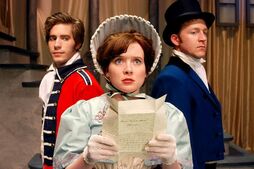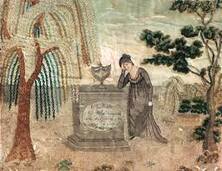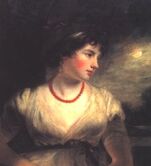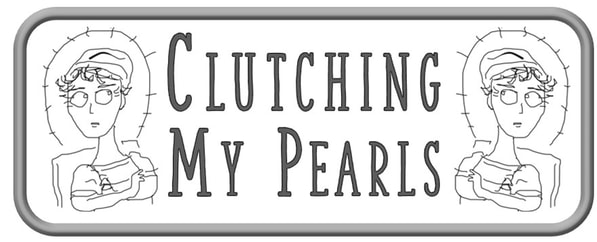| Clutching My Pearls is my ongoing blog series about my take on Jane Austen’s beliefs and ideas, as based on her novels. Click here for the first in the series. |
 Pride and Prejudice 2012 stage production. Photo: Chicago Sun-Times
Pride and Prejudice 2012 stage production. Photo: Chicago Sun-Times However, the plot of Pride and Prejudice turns on another characteristic habit of English gentlemen: Darcy does not deign to explain his past dealings with Wickham even though Wickham has slandered him. His reticence has consequences: too late, Darcy realizes that Wickham has prejudiced the mind of the woman he loves against him. Stung, he writes Elizabeth a long letter. After realizing she misjudged Darcy and Wickham, Elizabeth tells her sister Jane. They both decide to keep the whole matter to themselves, as Darcy would wish, and to preserve Wickham's character -- after all, he's leaving town anyway. But that has unforeseen consequences...
Now we get to the crux of the matter. As Mrs. Gardiner explains: "He generously imputed the whole to his mistaken pride, and confessed that he had before thought it beneath him to lay his private actions open to the world. His character was to speak for itself. He called it, therefore, his duty to step forward, and endeavour to remedy an evil which had been brought on by himself."
This is the "Pride" in "Pride and Prejudice." Darcy has carried his implacable pride too far, which is also why he totally botched his first proposal of marriage to Elizabeth. When they are happily reconciled, he tells her, "by you, I was properly humbled."
Darcy holds his reputation to be so unimpeachable that he will not descend to defend himself. Was this a common attitude at the time or was he unusually aloof?

An indignant public was shocked at accounts of women and children being trampled down in the street or stabbed with bayonets. Francis Phillips, a gentleman who witnessed the incident and subsequently defended the magistrates, explained "it would be derogatory to the dignity of the Magistrates, who felt in the fullest degree the consciousness of rectitude… to descend to a defense of their conduct.”
I came across another fictional example of this kind of proud reticence in Dr. Thorne [1858] a novel by Anthony Trollope, in a passage about a professional feud between doctors:
| Dr Fillgrave responded in four lines, saying that on mature consideration he had made up his mind not to notice any remarks that might be made on him by Dr Thorne in the public press. The Greshamsbury doctor then wrote another letter, more witty and much more severe than the last; and as this was copied into the Bristol, Exeter, and Gloucester papers, Dr Fillgrave found it very difficult to maintain the magnanimity of his reticence. It is sometimes becoming enough for a man to wrap himself in the dignified toga of silence, and proclaim himself indifferent to public attacks; but it is a sort of dignity which it is very difficult to maintain. As well might a man, when stung to madness by wasps, endeavour to sit in his chair without moving a muscle, as endure with patience and without reply the courtesies of a newspaper opponent." |
 "where there is a real superiority of mind, pride will be always under good regulation.”
"where there is a real superiority of mind, pride will be always under good regulation.” In his influential work, A Theory of Moral Sentiments (1759), the economist Adam Smith analyzed and explored human nature with observations of people and society. For example, he says we admire someone who reacts to the loss of a loved one with fortitude and self-command. (I think some of the reactions that he assumed were universal were in fact particularly British, such as the British admiration for stoicism and the stiff upper lip. In other cultures, you would be expected to wail loudly and tear your clothes upon the death of a loved one.)
Just like Mary Bennet, Smith distinguishes between pride and vanity.
Smith says of the proud man: "When we compare them with [their critics] they may appear... very much above the common level. Where there is this real superiority, pride is frequently attended with many respectable virtues; with truth, with integrity, with a high sense of honour, with cordial and steady friendship, with the most inflexible firmness and resolution."
Does that sound like anyone we know?

"To be disgraced in the eye of the world, to wear the appearance of infamy while her heart is all purity, her actions all innocence, and the misconduct of another the true source of her debasement, is one of those circumstances which peculiarly belong to the heroine's life, and her fortitude under it what particularly dignifies her character. Catherine had fortitude too; she suffered, but no murmur passed her lips."
"The love of just fame... is not unworthy even of a wise man. He sometimes, however, neglects and even despises it; and he is never more apt to do so when he has the most perfect assurance of the perfect propriety of his own conduct. His self-approbation, in this case, stands in need of no confirmation from the approbation of other men."
Jane Austen published her novels anonymously in her lifetime, and this is typically ascribed to the patriarchal system she lived in. But in the early days of the English novel, it was common for men as well as women to publish anonymously, and this often had to do with dignity and reticence. As Professor John Mullan explained on a BBC In Our Time program, "Writers who achieve popularity and fame have to go through all sorts of maneuvers to claim that they didn't mean it. Great writers of the early 18th century like Pope and Swift sometimes pretend that they didn't write a book or that it got published by accident." In his book Anonymity: a Secret History of English Literature, Mullan adds that in the 16th century, "Ambitious writers who did allow their work to be printed often exhibited reluctance or distaste."
Of the reticence of Jane Austen and other female writers, Mullan says: "Sometimes it is difficult to disentangle gender from class when encountering prejudices against publication. At a time when it was widely considered ungentlemanly for a man to publish under his own name, we should not suppose that clever women would have resented the requirement that they keep their names off what they write... It was in bad taste for a man to publish what he had composed, and doubly unacceptable for a woman."

For a final example of reacting to criticism with "silent contempt," we have the poet and author Anna Laetitia Barbould. She wrote an anti [Napoleonic] war poem, 1811, (which I quoted in my Remembrance Day blog post). When the poem was published, it received a sarcastic and condescending review, calling Barbould to task for writing about public affairs: "She has wandered from the course in which she was respectable and useful... an irresistible impulse of public duty [has] induced her to dash down her shagreen spectacles and her knitting needles and stray outside her domestic sphere of competence."
Barbould's friend, fellow author Maria Edgeworth, wrote to her: "I cannot describe to you the indignation or rather the disgust that we felt at the manner in which you are treated in the Quarterly Review... My father and I in the moment of provocation snatched up our pens to answer it, but a minute's reflexion convinced us that silent contempt is the best answer."
We don't know if Barbould agreed, or wished that Edgeworth had spoken up to defend her.
| In my novel A Marriage of Attachment, poor Fanny Price's character is attacked by a woman who is jealous of her. For more about my Mansfield Trilogy, click here. Dr. Emma Clery has written a book about Barbould's outspoken poem: Eighteen Hundred and Eleven: Poetry, Protest and Economic Crisis. |

 RSS Feed
RSS Feed